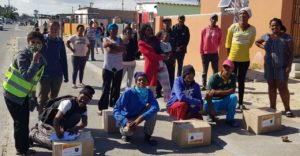Statement: Nutrition and food security is a critical plank in the strategy to beat COVID-19 infection!

R2K NWG member, Wendy Pekuer has been distributing food hampers to retrenched farm workers with the assistance from Things On Wheels.
R2K welcomes the report by the Economic Development Partnership (EDP) in the Western Cape which details the growing food insecurity crisis stemming from the COVID-19 pandemic. Poor communities from Delft to Masiphumelele, from George to Witzenberg report on dwindling food supplies, increasing feeding lines and starving families. The contents of the report are sobering and serve to confirm that vulnerable communities of the “existing poor” – street traders, spaza shops owners, small scale fishers and farmers, seasonal farm workers, – have expanded to include “newly poor” caused by job losses and small business closures.
The unforeseen consequences of the pandemic – and the government’s response – have affected the lives of millions of people in South Africa. First it was the huge spike in gender-based violence as people were forced to stay home under lockdown level 5 and the incidence of domestic violence increased significantly. Next, the government’s heavy handed and repressive implementation of the lockdown has led to more than 243,000 people arrested for breaking the lockdown and now having criminal records. The economic lockdown for more than four months has left the economy reeling as many businesses have closed their doors and unemployment has soared. And with it many millions have lost the ability to provide for themselves and their families and they also therefore lost their ability to access food and nutrition and that places them at additional risk further.
Widespread reports that SASSA has failed to pay the R350 per month promised to those with no other income only underline the desperation of many. Such people cannot be expected to observe any kind of lockdown. In some cases the applications have not even been processed.
While the report focuses on the Western Cape, the impact of the pandemic has been felt throughout the country. The report goes on to highlight the efforts of communities to face these effects. We want to commend the efforts of all of the community structures and civil society organisations who have come together to set up food gardens, soup kitchens and other community feeding schemes to provide food to the most vulnerable and needy in their communities. While we were called to do physical distancing, the need for social solidarity became greater and greater. What we are seeing now though, is that the continued ability to provide that support and solidarity is coming under more pressure. With more and more mouths to feed, donations and other resources are drying up. Government programmes on the ground are not visible. It is clear that civil society and communities are taking the responsibility to assist in maintaining food aid to marginalized communities. Municipality led evictions are more apparent than state subsidized food security programmes.
We support a “whole-of-society” approach which means harnessing the capacity of the government, the private sector, civil society and community structures to work collaboratively to ensure that those who need assistance and support the most, get it. No one stakeholder, working by itself is able to do it all. Civil Society and community structures have been a very important wall against the food insecurity that was there even before the advent of COVID-19, however they cannot continue to do so by themselves. We wish to encourage the active citizenship and solidarity that has been shown in this time of crisis; we also wish to urge greater partnership with government and the private sector to continue to meet the immediate needs – and to look to the longer-term rehabilitation of the capacity of communities to feed themselves.
Nutrition and food security is a critical plank in the strategy to beat COVID19 infection. We need an active and engaged citizenry for a healthy society.
#ActiveCitizenship #ParticipatoryDemocracy
For more information contact:
Wendy Pekeur, R2K NWG/WC Member: 060 624 3215
Burton Jaganathan, R2K KZN Coordinator: 076 215 4223
General Moyo, R2K Gauteng Member: 062 473 9703


